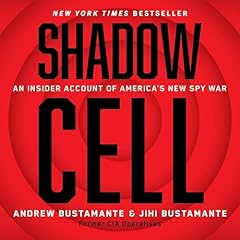
How Spies Think
Ten Lessons in Intelligence
No se pudo agregar al carrito
Add to Cart failed.
Error al Agregar a Lista de Deseos.
Error al eliminar de la lista de deseos.
Error al añadir a tu biblioteca
Error al seguir el podcast
Error al dejar de seguir el podcast
 Exclusivo para miembros Prime: ¿Nuevo en Audible? Obtén 2 audiolibros gratis con tu prueba.
Exclusivo para miembros Prime: ¿Nuevo en Audible? Obtén 2 audiolibros gratis con tu prueba.Compra ahora por $15.62
-
Narrado por:
-
David Omand
-
De:
-
David Omand
Brought to you by Penguin.
From the former director of GCHQ, learn the methodology used by the British intelligence agencies to reach judgements, establish the right level of confidence and act decisively.
Intelligence officers discern the truth. They gather information - often contradictory or incomplete - and, with it, they build the most accurate possible image of the world. With the stakes at their absolute highest, they must then decide what to do.
In everyday life, you are faced with contradictory, incomplete information, too. Reading the news on social media, figuring out the next step in your career, or trying to discover if gossip about a friend is legitimate, you are building an image of the world and making decisions about it.
Looking through the eyes of one of Britain's most senior ex-intelligence officers, Professor Sir David Omand, How Spies Think shows how the big decisions in your life will be easier to make when you apply the same frameworks used by British intelligence. Full of revealing examples from his storied career, including key briefings with Prime Ministers from Thatcher to Blair, and conflicts from the Falklands to Afghanistan, Professor Omand arms us with the tools to sort fact from fiction, and shows us how to use real intelligence every day.
'One of the best books ever written about intelligence analysis and its long-term lessons. Brilliant, lucid and thought-provoking' Christopher Andrew, author of The Defence of the Realm: The Authorized History of MI5
© David Omand 2020 (P) Penguin Audio 2020
Los oyentes también disfrutaron:




















Las personas que vieron esto también vieron:








Full of valuable insights
Se ha producido un error. Vuelve a intentarlo dentro de unos minutos.
worth a listen
Se ha producido un error. Vuelve a intentarlo dentro de unos minutos.
How WESTERN spies think
Se ha producido un error. Vuelve a intentarlo dentro de unos minutos.
Although familiar with the SEES model, the author does a fantastic job explaining it.
The last three chapters ruined the read substantially. David Omand seems to engage in exactly the sorts of flawed thinking practices he warns against. For this reason it gets 3 stars from me.
It’s a thought provoking book and I highly recommend it.
Great read
Se ha producido un error. Vuelve a intentarlo dentro de unos minutos.
Great insights, however…
Se ha producido un error. Vuelve a intentarlo dentro de unos minutos.


